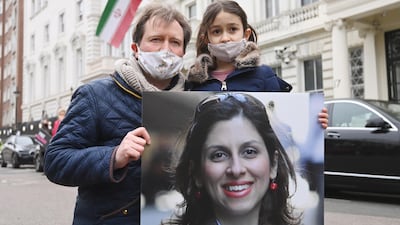The removal of Nazanin Zaghari-Ratcliffe's ankle tag by Iranian authorities last week should have given the British-Iranian charity worker and her family joy, relief and hope. Zaghari-Ratcliffe was arrested at Imam Khomeini International Airport in Tehran in April 2016. Her five-year prison sentence on highly suspect charges of plotting to overthrow the country's regime – charges she has consistently denied and the details of which have yet to be made public – was completed last week. By now she should have been free to leave Iran and rejoin her husband and six-year-old daughter in the UK.
Instead, her release has brought only a deep sense of foreboding. Upon her release, the world learned that she is to face a new trial on a different set of charges.
Zaghari-Ratcliffe is scheduled to appear in court to confront allegations that will no doubt be as trumped-up as the ones that saw her arrested five years ago. Her husband, Richard Ratcliffe, was not even sure if a new trial would happen at all – such is Tehran's unpredictable nature.
The only thing that can be assumed safely about the regime trying Zaghari-Ratcliffe is that it will go to any lengths to damage, and perhaps even destroy, the well-being of individuals like her if, in doing so, it will accomplish broader, geopolitical objectives. Zaghari-Ratcliffe is one of several dual Iranian citizens who have been spuriously imprisoned in this way, and their detention has long been thought to be related to demands Tehran wishes to extract from the countries that issued their other passports. In Zaghari-Ratcliffe’s case, her ordeal is suspected to be linked to a payment Iran has long claimed is owed to it by the British government.
On Wednesday, British Prime Minister Boris Johnson demanded Zaghari-Ratcliffe's immediate release during a phone conversation with Iran's President, Hassan Rouhani. Whether or not Mr Rouhani is committed to accommodating his request is irrelevant, as it is his government's more hardline elements that call the shots on so-called national security issues, like the hostage-taking of dual nationals. Zaghari-Ratcliffe was arrested by the all-powerful Islamic Revolutionary Guard Corps, and was tried in a special Islamic Revolutionary Court.
Therein lies the core of the problem. The rising domestic power of the IRGC has corresponded with a rise in arrests and sentencings of dual nationals. As the world becomes more intolerant of Iran's erratic behaviour, including its illicit nuclear weapons programme and destabilising activities in the Middle East, the sanctioned and increasingly isolated government chooses to respond only with greater bellicosity towards defenceless targets.
The past five years have been long and painful for Zaghari-Ratcliffe. According to a medical report commissioned by the humans right group Redress, she has been a victim of torture and requires urgent psychiatric care for depression and post-traumatic stress disorder. The conditions she suffered in her Tehran jail cell have reportedly led to hair loss and obsessive compulsive disorder.
The Redress report includes heart-breaking details, such as being forced to hear a prison guard talk to her daughter repeatedly at a time when Zaghari-Ratcliffe was distressed about being separated from her. That she was consistently denied consular access, as Iran does not recognise her dual citizenship status, did not help matters.
"Hostage" is the word Mr Ratcliffe uses to describe his wife. It remains unclear whether Tehran's demands from London will be met, whether it will make a difference or whether her future will now become linked to some other foreign policy issue, such as Iran's ongoing stand-off with the West over its illegal weapons programme. As Iran's geopolitical games become more complicated, so might Zaghari-Ratcliffe's own trials.








